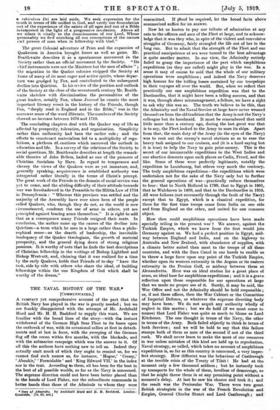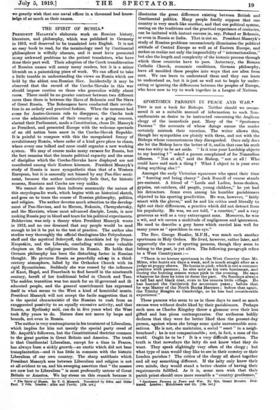THE NAVAL HISTORY OF THE WAR.*
[COMMuNICATED.]
A COMPACT yet comprehensive account of the part that the British Navy has played in the war is greatly needed ; but we are frankly disappointed with the attempt of Mr. Archibald Hurd and Mr. H. H. Bashford to supply this want. We are familiar with the broad lines of the story—with the instant withdrawal of the German High Seas Fleet to its bases upon the outbreak of war, with its occasional sallies at first in detachmenta and at last in force, with the sweeping of the German flag off the ocean within five months,' with the blockade, and with the submarine campaign which was the answer to it. Of all this the authors have nothing new to tell us. Indeed they actually omit much of which they ought to remind us, for we cannot find such names as, for instance, Hogue," Cressy,' 'Aboukir,' Formidable ' and Ring Edward VIL' in the index nor in the text. According to them, all has been for the best in the best of all possible worlds, so far as the Navy is concerned. The supreme direction could not have been better placed than in the hands of Lord Fisher, nor the subordinate commands in better hands than those of the Admirals to whom they were
committed. If /1toof be required, let the broad facts above summarized suffice for inanswer.
Now let us hasten to pay our tribute of admiration at any rate to the officers and men of the Fleet at large, and to acknow ledge that it was they who, in spite of the violent and convulsive struggles of Germany, fairly strangled the life out of her in the long run. But to admit that the strength of the Fleet and our practical omnipotence at sea were turned to the best advantage is quite another matter. In our view, the Admiralty entirely failed to grasp the importance of the part which amphibious
expeditions (as they are called) might play in the war. In a
sense it may of course he said that the whole of our military operations were amphibious ; and indeed the Navy deserves high honour for the triffing losses sustained by our troopships in their voyages all over the world. But, when we reflect that practically our one amphibious expedition was that to the Dardanelles, that it might have been a telling success, and that it was, through sheer mismanagement, a failure, we have a right to ask why this was so. The truth we believe to be this, that the Admiralty and the Naval Service at large have never weaned
themselves from the old tradition that the Army is not the Navy's colleague but its handmaid. It must be remembered that until little more than a century ago, during the last great war that is to say, the Fleet looked to the Army to man its ships. Apart from that, the main duty of the Army (in the eyes of the Navy) was to root out the enemy's naval stations so as to ease the heavy task assigned to our cruisers, and (it is a hard saying but it is true) to help the Navy to gain prize-money. This is the secret of our innumerable expeditions to the West Indies and our abortive descents upon such places as Cadiz, Ferrol, and the like. Some of these were perfectly legitimate, notably the expedition to Louisbourg, but others very much the contrary. The truly amphibious expeditions—the expeditions which were undertaken not for the sake of the Navy only but to further the general operations of war—practically reduce themselves to four : that to North Holland in 1799, that to Egypt in 1801, that to Walcheren in 1809, and that to the Dardanelles in 1915. All were failures (not necessarily through the fault of the Navy) except that to Egypt, which is a classical expedition, for there for the first time troops came from India on one side and from England on the other, and united for onts common object.
How then could amphibious operations have been made specially telling in the present war ? We answer, against the Turkish Empire, which we knew from the first would join Germany against us. We had a perfect position in Egypt, midway between England and India, and on the highway to Australia and New Zealand, with abundance of supplies, with a climate better suited than most to the troops of all these countries, and with the Suez Canal in our hands to enable us to throw a large force upon any point of the Turkish Empire, whether upon its western extremity in the Aegean or its eastern extremity in the Persian Gulf, or midway between them at Alexandretta. Here was an ideal station for a great place of arms, an ideal base for amphibious expeditions ; and it is a grave reflection upon those responsible for our operations at large that we made no proper Use of it. Surely, it may be said, the War Office and not the Admiralty should be held responsible ; or, if not these offices, then the War Cabinet or the Committee of Imperial Defence, or whatever the supreme directing body may have been.. We do not acquit any authority wholly of neglect in this matter ; but we do hold (if we must come to names) that Lord Fisher was quite as much to blame as Lord Kitchener. The one thought in teems of the Navy, the other in terms of the Army. Both failed abjectly to think in terms of both Services ; and we will be bold to say that this failure stamps both of them as men of the second if not of the third rank. We shall never learn to make the most of our resources in war unless mistakes of this kind are held up to reprobation. Naval strategy, so called, which takes no account of amphibious expeditions is, so far as this country is concerned, a very imperfect strategy. How different was the behaviour of Castlereagh at the terrible crisis of the Treaty of Tilsit ! He had at the moment only a few thousand soldiers ; but he instantly took up transports for the whole of them, heedless of demurrage, so that he might throw them in at any promising point without a moment's delay. At last he saw his chance and took it ; and the result was the Peninsular War. There were two great British strategists in the war of the French Revolution and Empire, General Charles Stuart and Lord Castlereagh; and
we greatly wish that one naval officer in a thousand had knowledge of so. much as their names.















































 Previous page
Previous page